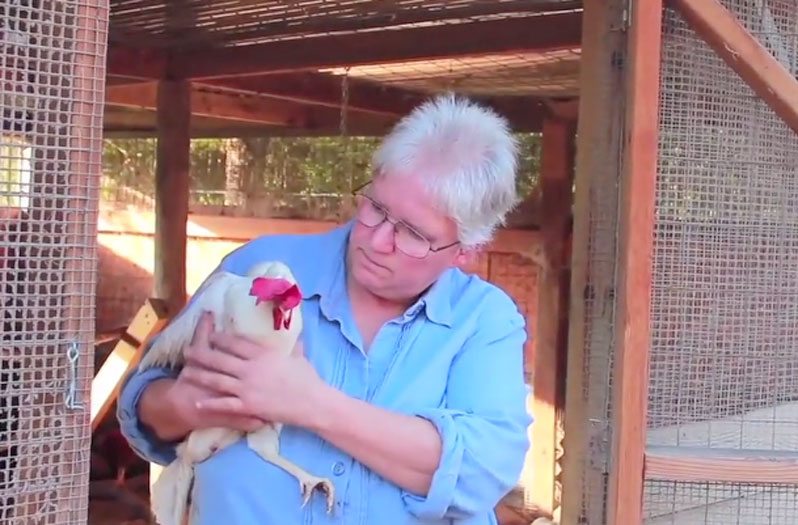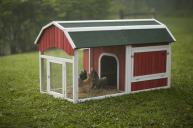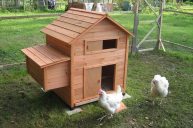Chickens ain't just for the farm anymore. It seems like everyone, from your neighbor to the tattooed, bearded hipster barista at your local coffee shop, is putting chickens in their backyard. And why not? Chickens are sustainable and produce farm fresh eggs. They're pretty entertaining too.
But there's a lot to learn if you're raising chickens for the first time. And if you're thinking about starting your own flock there's only one person you need to call: Mary Ann Fordyce, the chicken lady.
Fordyce, who's been raising chickens for over eight years, is Texas' go-to source for advice on backyard chickens. Folks drive from all across Texas to visit her Blue Star Ranch, previously located in Bellville, where she sells eggs, chickens, chicken coops, chicken composts, organic feed and everything else you need to raise a healthy flock.
For Fordyce, it's a dream job. She loves chickens and she's fascinated by everything about them. Literally, everything.
"I could talk for hours and hours about chicken manure," Fordyce says, laughing. "Don't get me started, please."
Chicken manure, which is high in nitrogen, is a great fertilizer for vegetable gardens. But that's only one benefit of the fabulous fowls. As Fordyce says, chickens are just fun to hang out with.
"I think I get along with chickens better than people," Fordyce says. "Chickens are very easy to get along with. They're fun to watch. They're very predictable and very easy to raise."
Fordyce didn't plan on making raising chickens her career.
"It started out as a hobby," Fordyce explains. "As it got a little bit bigger, I realized that it was becoming popular so I just got into it as a small business just for a little bit of egg money. Then I found out that so many people really didn't know anything about it and I started putting up the website and started writing articles."
Her articles, which range from how to make a chicken compost to keeping your flock safe from predators, are an in-depth source for anyone interested in starting a backyard flock.
The Scoop from the Coop
Fordyce's insight is particularly useful as cities like Austin are offering rebates to residents willing to keep chickens in their backyard and take classes on maintaining healthy chicken coops.
Mary Ann says people are starting to embrace a more natural, sustainable lifestyle.
"I think it's way beyond the agriculture aspect," Fordyce says. "I think chickens are just becoming part of an everyday life like they were many years ago when it was just accepted to have chickens. In the cities, the laws and rules are changing because this is what people want."
Just in time, Fordyce is opening a brand new location in Austin next week at 5305 Hudson Bend Road (one mile from Lake Travis). She shared some of her tips on raising a safe, healthy flock with Wide Open Country.
Free Range or Coop?
According to Fordyce, the first step is to decide up front whether you want to "free-range" your chickens or put them in a coop with a run on it.
Balance the bacteria
Fordyce says it's important to remember not to over clean your coop. While you should keep a tidy space for your fowls, using items such as bleach to clean the coop makes your chickens susceptible to sickness.
"Use nature to make yourself a natural environment for the chickens without making it like a cage," Fordyce notes. "It can't be too clean. It's got to have the right bacteria."
Give them a healthy diet
Giving your chickens only corn and chicken food is not good, Fordyce says. A healthy diet includes a balance of greens and bugs.
Don't expect eggs every day
Fordyce explains that indoor chickens under certain conditions may lay eggs every day, but natural chickens that live outdoors may only lay three or four eggs a week.
"If it's rainy or stormy they may not lay at all for a couple of days," she says. "So many people think five chickens equals five eggs. But it doesn't really."
Remember that chickens are delicate
Some breeds are more delicate than others.
"I tell people, start with a heavy-duty commercial breed and then add all your fancy, pretty chickens. To start off, you want an easy breed to raise," Fordyce noted. "A show chicken isn't going to give you very many eggs. They're exotic and rare because they don't lay eggs. That's why they're exotic and rare—they don't reproduce as much."
Keep Fido and Fluffy away
While we love all of our backyard friends, both those with feathers and fur, pet dogs can pose a serious threat to chickens if they haven't been raised around the birds. Fordyce suggests not letting your chickens out around the family dog.
"The biggest danger to chickens is your pet dog," she warns. "People don't believe it til it happens."
For more information and further advice from the "chicken lady" contact her here.




